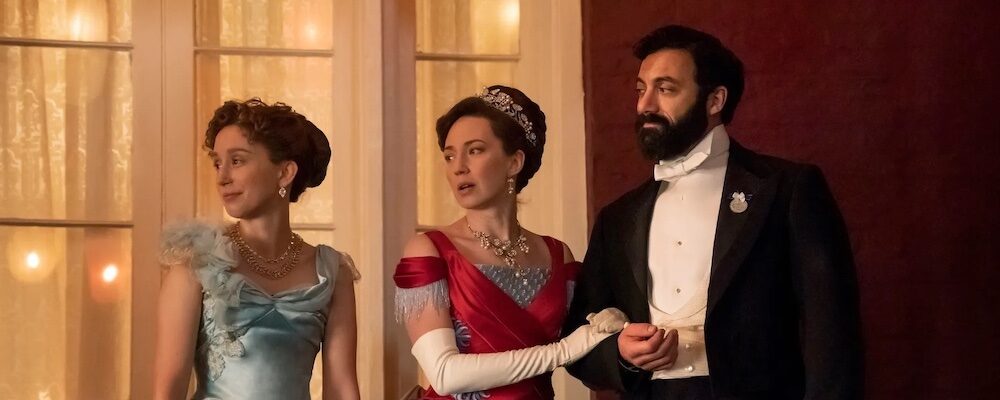‘The Gilded Age’: Julian Fellowes’ Lush Melodrama Expands Into Opera Wars for a Juicier Second Season
Alci Rengifo
There’s a wicked pleasure in watching shows that make us feel like we’re snooping on the gossip of the elites. HBO’s “The Gilded Age” is never about action or “suspense,” but the fly on the wall feeling of its chatter. It is true that this creation from Julian Fellowes, who gave the world “Downton Abbey,” has much to say to our own time with its robber barons and struggling working class. But like its English predecessor, the fun is in hanging out with the aristocrats of the era defined by the show’s very title. This season is as good as the first, with twists and developments hinging on marriages, last names and being invited to the right dinner party.
It’s New York City circa 1883 and the theme this season is the “Opera Wars.” Tensions remain between the “old money” elites and those of the “new money” camp trying to rise. The latter is still represented by Bertha Russell (Carrie Coon), who last season defied the prejudices of the social food chain to make her way into the city’s highest circles. Alas, early this season she realizes she’s still not high enough to get a box at the Academy of Music opera house. Not to be deterred, Bertha decides to throw her money behind the new Metropolitan Opera. This sets off a war with the old moneyed ladies such as Agnes van Rhijn (Christine Baranski) and her sister, Ada (Cynthia Nixon), who vow to support the Academy. Meanwhile, Peggy Scott (Denée Benton) is still trying to pursue her ambitions as a journalist, taking on an assignment that will send her into the south, which for a Black American writer comes with many dangers. Peggy’s friend, Marian Brook (Louisa Jacobson), niece of Agnes, is meanwhile begins teaching at a private girl’s school which brings her into the orbit of a dashing widower, Dashiell Montgomery (David Furr).
“The Gilded Age” gracefully balances humor and drama, creating characters we enjoy following even as it slyly pokes at their social class. The world of the series is one where wealthy patrons watch a tennis match as someone wonders why they should go to museums when “I have a life to live.” For a series that’s driven so much by dialogue, the pacing has a snappy, engaging rhythm. Something seems to be happening in every scene and “The Gilded Age” has less of a slow burner feel than your average crime thriller. And for a series about the economic lords of the land, the tensions at play can be down to earth. Bertha’s industrialist husband, George Russell (Morgan Spector), grapples with the power of labor unions demanding workers’ rights. Bertha’s own storyline is about more than just getting a box at the opera, it’s leading to the opening of New York’s famous the Met. Peggy’s journey into the south is a striking reminder of the cruel racism of the era, while also contrasting with the fact that in the north, a Black American still didn’t find true equality in the late 19th century. The Civil War had only taken place 20 years prior. Michael Braugher is memorable as author Booker T. Washington, who crosses paths with Peggy.
Within the grander scale of the season, we get many of those microcosmic storylines that make a show like this even more enjoyable. It’s nice to take a break from the intense drama to catch up with Oscar (Blake Ritson) Marian’s closeted cousin who continues to search for a proper, wealthy wife to marry out of convenience. Bertha’s son Larry (Harry Richardson) starts seeing an older widow, Susan Blane (Laura Benanti), which infuriates mom. The house servants also get plenty of space. One creates a particular invention while others face the wrath of Agnes, who can fire someone without blinking. Ada is given an endearing, romantic storyline this season with the introduction of a pastor played by Robert Sean Leonard, who has the right kind of kind, open personality to challenge the icy environment created by Agnes. Maybe sometimes being nice can overcome class barriers. It’s a key question in a series about the rich where we empathize with many of the characters, even as the material acknowledges they can be ruthless, strike-breaking oligarchs.
In the same way “Downton Abbey” cheerfully included historical nods to events like the Titanic, “The Gilded Age” mixes in lots of anecdotes into the writing such as the secret architect responsible for the Brooklyn Bridge, which is opened with a glorious scene full of fireworks. Taissa Farmiga, taking a break from fighting evil in “The Nun” movies, is once again a delight as Bertha’s daughter Gladys. Fans will then be thrown back by a particular twist half-way through the season. Far from stuffy, “The Gilded Age” succeeds in keeping the audience on its toes with its mixture of melodrama and genuine grandeur. It feels like a genuine trip back in time, while rushing along with the same juicy intrigue we feel when scanning the tabloids. Attending a party in this show is as riveting as any action scene, with all the action hidden in the chatter and elegance.
“The Gilded Age” premieres Oct. 29 and airs Sundays at 9 p.m. ET on HBO.

